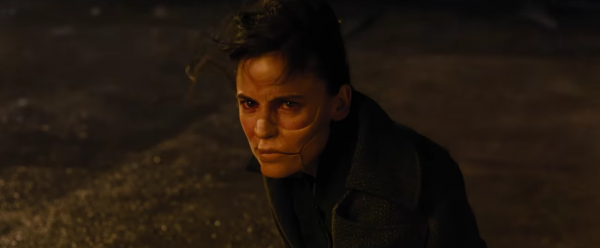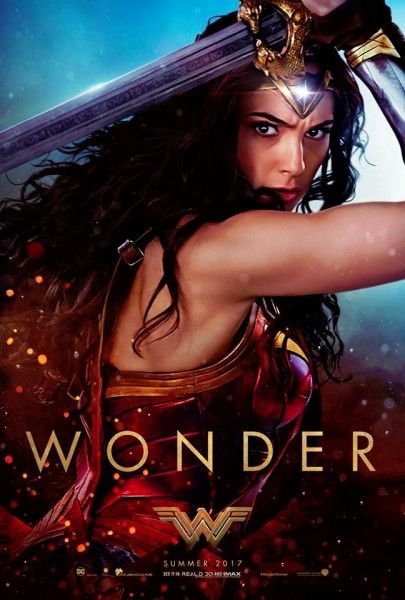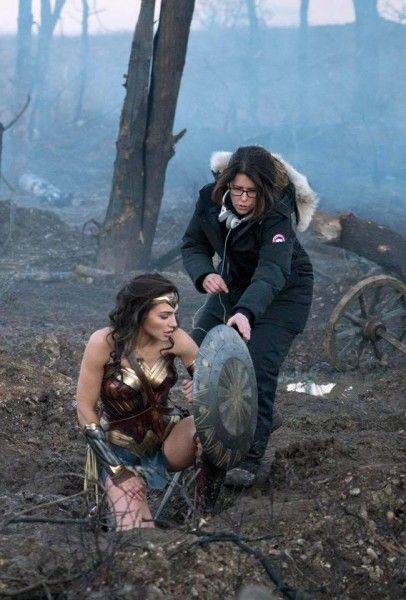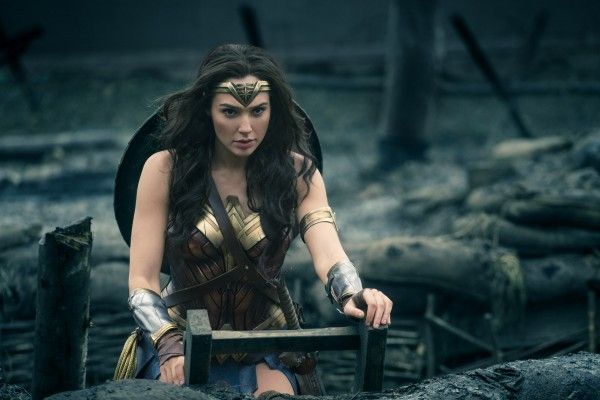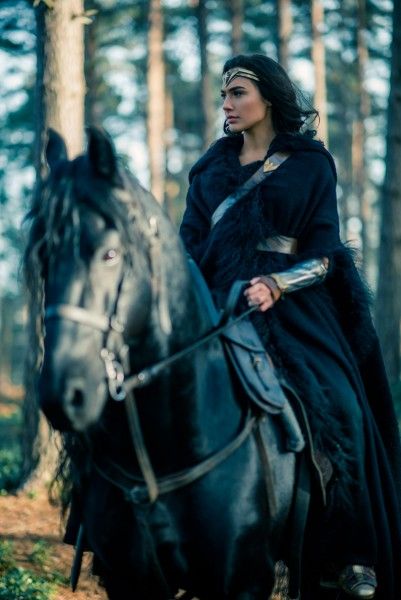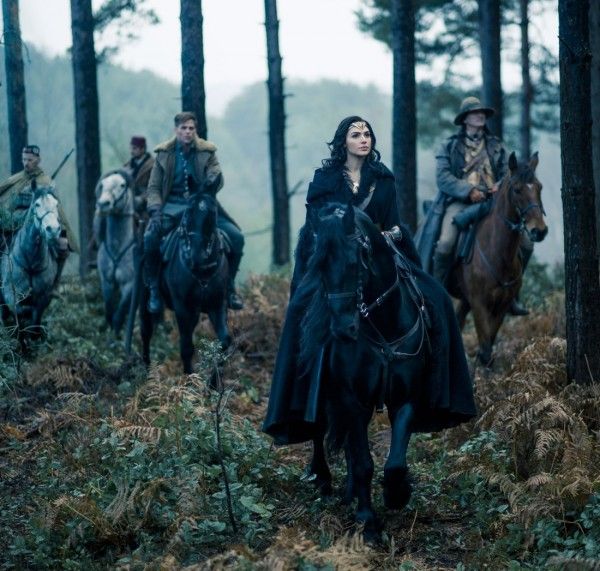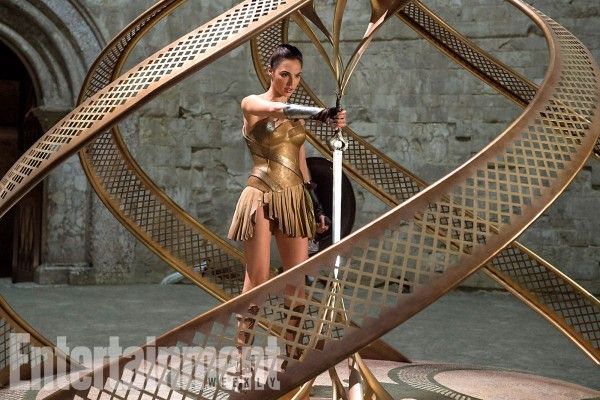The superhero genre has been going pretty much non-stop since 2000 with X-Men, and yet in all that time, there’s only been one superhero movie directed by a woman (Lexi Alexander for 2008’s Punisher: War Zone, which is an amazing movie). Women typically don’t get the chance to direct blockbuster films in general as they’re stuck in vicious, sexist Catch-22: “We can’t trust a woman to direct a blockbuster feature because she doesn’t have blockbuster feature experience.” Meanwhile, some dude with one Sundance film under his belt is given the keys to a major franchise.
Hopefully, Wonder Woman will change that calculus. It’s one of the biggest movies of the year, and it’s in the hands of director Patty Jenkins, whose sole feature directing credit before Wonder Woman was the Oscar-winning Monster. Since then, she’s done TV work, but hopefully Wonder Woman will be the first of many blockbuster features for her
While we didn’t get to talk to her during filming back in 2016, Warner Bros. brought us back to London to speak to Jenkins last week and see some clips from the movie. Some fellow journalists and I spoke to Jenkins about the expectations that come attached to Wonder Woman, her personal history with the character, how she was inspired by Richard Donner’s Superman, what she thinks makes Wonder Woman unique among superheroes, crafting a tone that’s different than other DC movies, setting the film during World War I, and much more. I’m envious of the reporters that will get to talk to her when the film is finally released, because she is sharp, insightful, and has a clear vision about Wonder Woman.
Check out the full interview below.
Do you think this movie will be received differently now coming into this administration than it would have been otherwise?
PATTY JENKINS: I have no idea. Interestingly, I’ll say this: This has been a contentious issue about this time, to my great surprise, regardless of who had won the election. I was just talking about this issue and I was raised by a strong, very feminist mother, single mother, but for whatever reason I was totally surprised by the reality that it wasn’t over a long time ago. So coming into my career, I was like, “Yeah, whatever,” but it appears there are these issues that have been around for a very long time, and a lot of people are saying, “Actually, not that much has changed for all of us.” So I think it’s a hotbed topic, regardless. What I want to be a part of is the next wave where, “Yes, it’s going to bring up a lot of conversation about it,” but the next wave is where we can just start making universal movies about other kinds of people and not have it be an issue. Just say, “Yes, this is a universal movie about a person wanting to be a hero; this one happens to be a woman.”
And that I think is the real challenge, so I went forward with that attitude. It’s interesting and it ends up being funny because the sexism comes to the fore because she’s walking into 1918 and she’s completely oblivious. She’s like, “This is what you wear into battle, right?” She just keeps being completely confused. She would never know about it. So there ends up being accidental comments about it, but I also went into it not making a movie about a woman at all. I’m making a movie about Wonder Woman, who I love, who to me is one of the great superheroes, so I just treated her like a universal character, and that’s what I think is the next step when I think you can do that more and more and when studios have the confidence to do that more and more.
Can you talk a little bit about when you feel like we’ll most past that differentiation into male and female superheroes and hit that “next wave”?
JENKINS: Probably further from now than I’d like to think, although I’d like to be part of it insofar as I reflect back on my career and I realize I’d have a woman in the lead of everything I’ve done, but have not thought about that at all, any more than a man might think about it when they put a man in the lead. I have no agenda. I have a couple different projects starring men that are also projects of mine, so I just want to be a part of never thinking about that it’s a woman. When I made Monster, I didn’t think about it being about a woman, I didn’t think about that she was a lesbian. I was telling a story about a specific person who was tragic and looking for love in the world, and the more I could make her you, the more of a victory. Because I’m here because of Superman. I’m here because when I saw [Richard Donner’s] Superman as a kid, it rocked my world, and I was Superman. I was that little boy. I took that ride and that journey. I always say that Star Wars had a huge effect on me too, but what Star Wars did for some people, Superman did for me. I remember the theater, I remember the feeling, I remember I cried and I laughed and I went through that whole thing and I was Superman. I believed in myself as Superman, and that’s the beauty of film. Like whoever you make a movie about, it’s so old school to think that it matters. I don’t relate at all to people in Greek times, but we’re still talking about them. It doesn’t matter if they’re an elf or a dog or whatever. It’s just pick your character and tell your story that rings everybody’s bell.
So that’s what I think will be the next wave. Of course it’s a bummer that we’re going to be a “woman’s film”, but on the other hand, it’s important to talk about because I think a lot of time those movies haven’t been. It’s like those articles where movies directed by women win more Oscars, but women directors never get nominated for Oscars. It’s important to acknowledge, yet making the film it’s important to tune out. I don’t think about it at all.
What is about Wonder Woman’s heroism that makes her stand apart from superheroes like Batman or Superman?
JENKINS: I think they all have wonderful, different ideals, and for her it’s her belief system about the world in her own special way. She, besides Thor, is the only one who’s a god, and yet she has a very strong point of view. She believes in love, and she believes in truth. That’s a strong point of view. So Superman wants to save the world and all the superheroes want to save the world for a variety of reasons or they want revenge or they’re defending themselves. Whichever it is, she’s one of the only ones I can think of where she has a belief system that’s almost religious. “I believe in the betterment of you, and I believe in you, and I believe in truth. And I believe that you all can be better, and I will fight to protect you. But I also believe in better than that.” That’s wonderful to work with. And that is in this time. That’s something amazing to have. I believe in her. I believe that’s an important message right now. “I don’t want to fight. I don’t want to kill people. But if I’m in this situation, I’m going to fight for your right to be better people.” That’s a wonderful story to dig into. And have your own doubts about your struggles as the great superheroes have.
Can you talk about the decision process behind making Dr. Maru a female villain?
JENKINS: I think it was the same thing. It was important that it wasn’t the evil done by any gender or any person. It was about damage and darkness and what creates evil. In her case, she’s an interesting character because—we don’t get super into her backstory—but we know her backstory, which is that she’s a woman who’s had all kinds of damage in her life and now she delights in—and I’ve known people like this—delights in bringing that to other people’s lives. Like, “Oh, now you see. Now you see what I know. You can’t take it.” There is that way of being a damaged and dark person. You’re waiting for other people to face that wrath too. So I loved that about her, and she’s a character who’s focused in on developing all kinds of toxic weapons and tools. So I liked that they [Maru and Ludendorff] had two separate goals, but together they had a very bad intention, which is how I think real villains work.
How do you approach a movie for a character where the role was cast by someone else and that person also began the crafting process for that character?
JENKINS: It was interesting. It was a little of both. She had already been cast, and I remember because I had been talking to DC for a long time, and I remember reading in the paper when they cast her, and I was like, “Aw, they cast someone. I can’t believe it. This is the movie I always wanted to do.” But it wasn’t active at that time. But I honestly couldn’t mean this more, it’s a lesson to me about how things can happen all kinds of different ways, because I’m very picky about casting. Charlize [Theron] for Monster was something a lot of people didn’t believe in, so I was like, “You have to know what you’re doing and take a chance,” and I felt strongly about that.
To my great surprise, [Gadot] is the greatest person in the universe who could have played her. They did an amazing job casting her. So when I came on to the project, originally I had been talking to the studio a couple different times where they had been going about it in a way where I’m like, “I’m just not the right director for that, sadly,” because these are long roads and you can’t get into in a war where you want two different things. You have to sign on to something where you know you’re making the same thing.
When they came to a place during the making of Batman v Superman, where they decided they were going to make Wonder Woman, the great thing is they decided to do her origin story, and I was like, “Yes! That’s what I’ve been standing here waiting to do for all these years is her origin story.” The Wonder Woman that I grew up with and I love, and so nicely they cast this Wonder Woman, they’ve got this wonderful person, they’ve got this beautiful costume, but that’s it really. They had laid the story out where they were like, “We could tell this version of the story,” and we’re taking this from the original comic and we’re mixing in a little [writer George Perez] and we’re mixing a little—and this is how we would do it, but besides that, we were completely left on our own. BvS wasn’t even done, so nobody had seen it, nobody knew anything, so I didn’t see that movie until I was halfway through [Wonder Woman].
And they were super supportive. They’ve been great at being, “You’re the director that we’ve picked. This is how you want to go about it.” It’s interesting that the tone of it, I’ve come in and been inspired by [Richard Donner’s] Superman, which is a very bright, shiny character to me. So even if hundreds of years from now she ends up being slightly different because she’s changed a little bit, this is the way to tell this story. So the two things worked very hand-in-hand and were very supportive. We didn’t need to do anything else, which was great and rare.
Because this is set in 1918, how much pressure was on you to tie it into the modern day?
JENKINS: None. We very much told her origin story, and there’s little hints, but there’s nothing—we didn’t have pressure. That was something everybody was very supportive about that with this movie it should be the best it could be. Once you’re committed to making an origin story, then let it be that is my jam. I love that.
How did you approach telling Wonder Woman’s origin story, especially when it’s sometimes viewed as more complicated than what other heroes have?
JENKINS: I don’t think it is more complicated. I think Superman’s origin story was very little known really until they made the movie. How many men on the street were really down with the “Kal-El” and Krypton? They weren’t. So that’s what I’ve been saying for all these years: how do we make her the universal character that she is? Let’s make the movie! And I love her, so let’s do it! I think that any of these characters—maybe Spider-Man; Spider-Man is such a simple story that maybe we all grew up; like growing up I feel like I knew Spider-Man’s story before they made Spider-Man—but Batman, sort of; Superman, complicated; all of the Marvel heroes you certainly didn’t know many of the details of those stories unless you were reading those comics. They weren’t public knowledge, the history of Iron Man or whatever. So I don’t think it is more complicated. She has a world that she comes into this from as they all do, and her aim is very simple. It’s come and save mankind. And then she stays.
Did you have a connection to Wonder Woman growing up?
JENKINS: Yes, because she hit big when I was about seven, eight-years-old, and when it came to superheroes on the playground, that’s who you got to be. But I also loved that she was so beautiful and hot, so if you’re aspiration is like, “Oh, I’m going to play with the boys, but in my head, I look like Lynda Carter.” So that didn’t exist, but in my heart that was near and dear. It’s funny, all my notebooks, all my stickers, and my nickname was “Wonder Woman” in high school. I never thought about all this, adding it up, because I tripped spectacularly and it was for the wrong reasons, but still the Wonder Woman theme was a consistent presence. So if you have a choice, you’re going to pick the Wonder Woman myths, the Wonder Woman binding, but even in my 20s they started selling those notebooks, so it almost is like I think the identity of my generation, a lot of girls in my generation, it was really serious to. I talked through this process every time we talk about this movie, or anytime there’s a question about her fanbase, I’m just like, “Go out on Halloween. Let’s see.” There women and men dressed up as Wonder Woman to this day, but there’s really been no Wonder Woman to this day since the 70s; I mean, there’s been great animated things, but it’s not been because we’ve forced it down anybody’s throats.
Does having Wonder Woman in World War I change the historical context of what World War I is within this universe?
JENKINS: You know what is interesting is that when I first got back, they had decided to do World War I. And I was like, “Whoa. Let me think about that.” And then I almost very quickly loved it because we’ve seen World War II so much, because there are a lot of misunderstandings at play in World War I. The greatest thing is that it was not clear what was going on, and that’s great for her journey. And it’s the first mechanized war. Mankind was changing their belief system about what they were willing to do and what they weren’t. The big and most interesting about World War I was how there had been cavalry and that’s what you were proud of. Be there, you’re on your horse—now you’re just bombing people, and that’s her observation. You don’t know who you’re killing or what’s going on.
So I ended up thinking, “The truth with any of these superhero stories is that it’s not about World War II and it’s not about World War I. It’s about a god, a superhero/Amazon, coming to man’s world and viewing mankind.” So this war ended up being great and then it was really fun to apply a time period nobody knows, to balance the same superhero story you know to tones you do. Because that was my obsession coming in was tone. We have to be so careful it doesn’t look like a BBC documentary, so it doesn’t look silly that somebody has a superhero costume. We have to hit exactly that pocket, and you see it in our villains. You’ve got to hit that little pocket of comic superhero and then you bring it into a comic version of that time, and then they start culminating right there. And by the time they culminate, you’re like “Totally. She’s in that costume, and they’re fighting a war.” It was fun in that way to do it about a period of time people don’t know and to do it with a period where nobody can do this. You cannot cross no man’s land. And she can block bullets. So this was a scene I was deeply in love with from the start. When the two things finally collide, it’s going to be so great.
That’s the one we were on set for.
JENKINS: That’s right! I think it was the big rising up shot. I think we were on the far side. So crazy that you get to see it after all that.
Is there stuff you wanted to do with the character you didn’t get to because it was an origin story or stuff you’d like to do at a later date?
JENKINS: Hundreds of things. Many, many things I can’t wait to do with her. She’s got a lot of shades that I really, really like. I think whatever we get to do with her in the future, the great thing is that this is the way to start. This is the way to start, and then you give birth to a superhero that can go on to have all kinds of different shades and dimensions and the journey.
Will there be some kind of character dynamic switch in the present day? Will there be something that re-inspires her?
JENKINS: Yes, there will be. It also illuminates how we might be misperceiving what she actually is thinking in the future. I think this movie ends great and in a way that really helps to understand her, and she has a lot of shades in the future. But I think really when you look back at BvS, it’s a snapshot. You’re not getting a lot of information about her point of view, so I think there’s a lot of complexity in why she’s saying what she’s saying and why she is who she is.
Can you talk a bit about balancing the humor that’s part of a superhero movie but also making it part of a war film? Because we do see the humor in these clips.
JENKINS: Thank you. I just care about that. I care about that with all filmmaking. Very rarely do I not look for both because I believe that the truth has both. I’ve had tragedy in my life and it doesn’t stop comedy, so I think it’s important to do both. Particularly in a superhero movie, but in any movie that accesses all people. Nobody wants to be abused for two hours. I think entertainment is ebb and flow. I actually came up in comedy around comedians; I thought I would be a comic director and then I got the opportunity to make a serious movie and it went that way. I think casting, it’s one of the things I love about superhero movies, is that they have both, and then casting really funny people and making scenes not disrespectful, so you’re like, “Okay, good. Chris Pine is hilarious. But when the moment comes, Chris Pine is a great dramatic actor. So having somebody who can be both. She is hilarious, by the way. They’re both really funny. But having a character who can be a real person that has both sides and taking them on a journey where it’s not serious yet—it’s funny and they’re having fun—that’s kind of perfect. So I don’t feel like we went camp in a way that then contradicted it. I felt like we were making a straightforward film that was funny in parts and then got serious in others.
Can you talk a bit about the DC “tone” and how Wonder Woman fits into that?
JENKINS: All I can say is that from my point of view, there is no mandate on tone that I experienced. So I think every filmmaker is making their own movie in the tone that they see right for that movie. So I have no pressure on me to not do the same. So I came in saying, “Superman 1” and “It’s an origin story” and casting Chris, who I knew and was so funny, and all of these things. And they were seeing it shape up as what it shaped up as and supporting it. I think that will also be true with Aquaman and Flash all of those movies. I don’t think there is one tone. I think maybe Christopher Nolan had a serious tone, and Zack [Snyder] has a different tone that is also serious in a different way. So I think it became a perception that there was one tone, but that’s not what I had heard. I heard that there were these different superheroes and I was coming in to make one. And I was supported it making it the tone I wanted to make it.
Click on the respective links for more of our Wonder Woman set visit coverage:
- 'Wonder Woman': Over 50 Things to Know about the Iconic Superhero's New Movie
- 'Wonder Woman': Gal Gadot on Creating a Superhero That Young Girls Can Admire
- The 'Wonder Woman' Action Scene That Beings Heroism to DC Movies
- 'Wonder Woman' Scene Introduces New Concepts to DC Movies: Warmth and Humor
Wonder Woman opens June 2nd.

